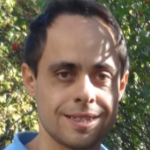Philippe JOLY
|
With an academic formation of Pharmacist-clinical biologist, Philippe joined the world of red blood cells in 2008 when he became assistant specialist at the Hospices Civils de Lyon (HCL) in the UF "Molecular pathology of red blood cells" created by Dr. Alain Francina ten years ago. Four years later, he defended his doctoral thesis related to modifier genes of the clinical severity of sickle cell anemia and became the Hospital Practitioner in charge of the "Red blood cell" department at the HCL. He continued working on hemoglobinopathies modifier genes and further extended his works to the contribution of blood rheology and oxidative stress in sickle cell disease. He co-supervised two doctoral theses on these topics. This enabled him to support his "Habilitation à Diriger des Recherches (HDR; Accreditation to Supervise Research)" in 2019. Responsible of the diagnostic group of the Rare Diseases MCGRE (Constitutional Diseases of the Red Blood Cell and of Erythropoiesis) group for several years, Philippe is also involved in the french "Plan France Médecine Génomique 2025" via its implication in the very high-throughput Auragen sequencing platform and the organization of one of the two national diagnostic SPCs for cases of constitutional diseases of the red blood cell in diagnostic wandering. In December 2020, Philippe had 59 publications in scientific journals in which he had signed as first, second, penultimate or last author. Its SIGAPS score for the period 2008-2020 was 1074. |
Philippe Joly (philippe.joly @ chu-lyon.fr)
Phone: 04 72 11 06 35 Institution Université Claude Bernard (Lyon 1) Team: [VBRBC] Position Hospital practitioner
Publications
|
1. Alpha-thalassemia has no influence on the severity of sickle-cell anaemia in very young children with a fully functional spleen (EJH 2011). 2. Excluding the genotype UGTA1A (TA)n, the risk of gallstones in children with sickle-cell anaemia is modulated by the alpha-globine genotype, the rate of reticulocytes and the frequency of vaso-occlusive fits (EJH 2017). 3. Participation in the clarification and valisation of the Thalassemia Severity Score (TSS), allowing the estimate the possible age of the first transfusion of beta-thalassemic homozygote patients (Haematologica 2015). 4. The modulator effect of alpha-thalassemia in sicke-cell anaemia varies depending on the number of polymorphismic inductors of haemoglobine F presented by the patient (PBC 2019). 5. Alpha-thalassemia lowers the level of oxydant stree in sickle-cell anaemia, probably through a reduction in myeloperoxidase activity (Antioxydants 2020). | |



